The trajectory of AI marketing trends suggests a future where marketing is more personalized, efficient, and data-driven than ever before.
Here are seven trends set to shape marketing in 2026 and beyond: from optimistic AI trends offering exciting opportunities for brands to connect with their audiences in more meaningful ways to the ones promising a 50% drop in organic search traffic.
Let's dive in and see how these advancements will redefine marketing.
1. GenAI-Powered Search Steadily Killing Organic Web Traffic
The 2022 report by Semrush has shown that 25% of all searches are zero-click, meaning that a user either has found an answer in SERP features or by simply scanning through meta descriptions or hasn't found an answer and decided to refine their query. Zero-click searches, as implied by the name, don't result in website visits and revenue consequently.
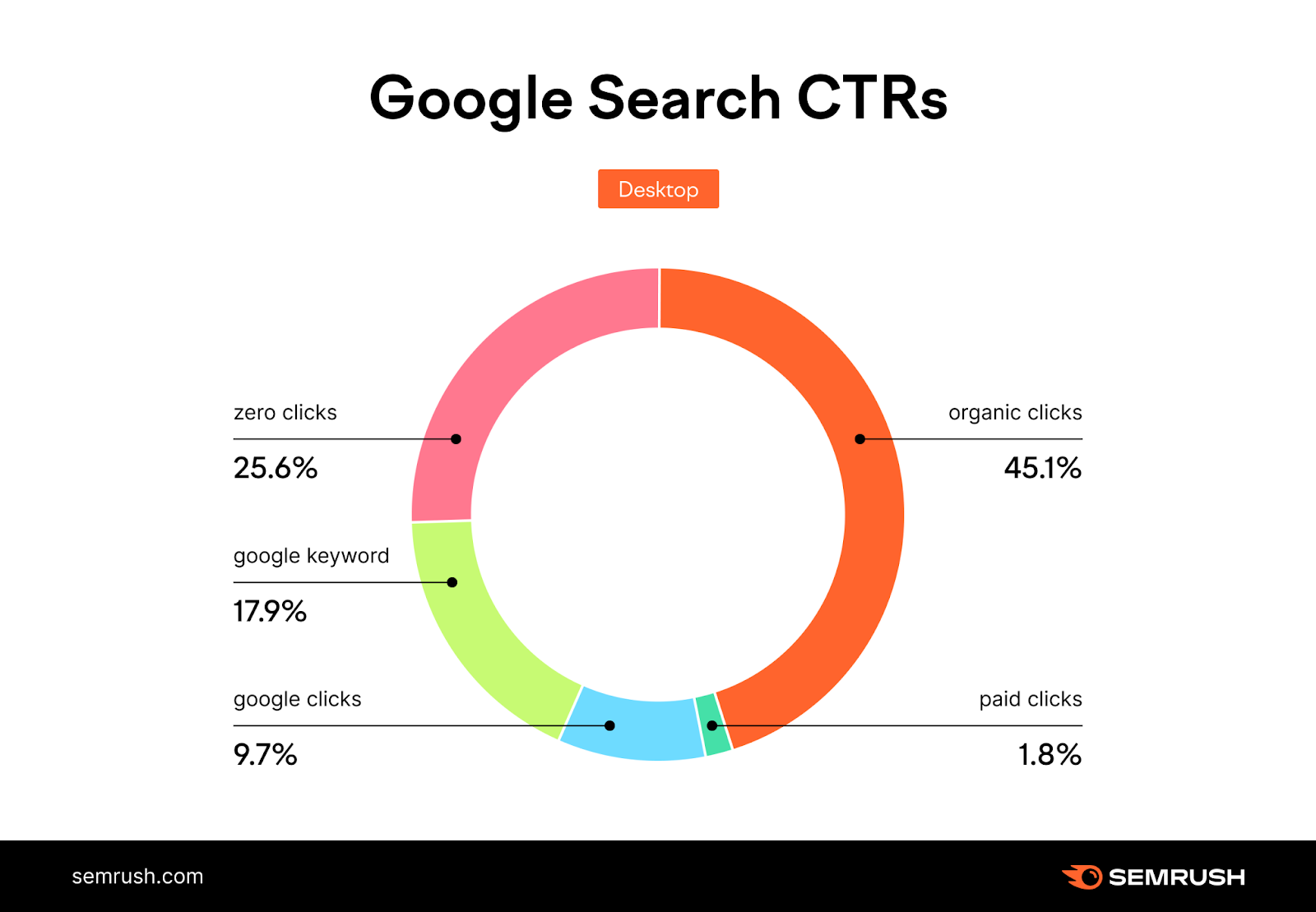
Users can now find an answer in the 'People also ask' section or by looking through an overview of tools. New and new SERP features have already impacted web traffic, but recent advancements can become "the most disruptive thing that has ever happened to search", says Eli Schwartz.
First, people are starting to adopt ChatGPT, Bard, or other generative AI tools to run searches. There are already cases when a prospect says that has found a company through GPT-search, and the number of cases like that will increase over time.
Speaking of AI-assisted SERP, in May 2023, Google announced that it's working on Search Generative Experience (SGE). SGE is an AI and LLM-powered SERP feature that analyzes the top searches and provides an AI-generated answer to your query. Users will be able to ask follow-up questions and proceed with their searches.
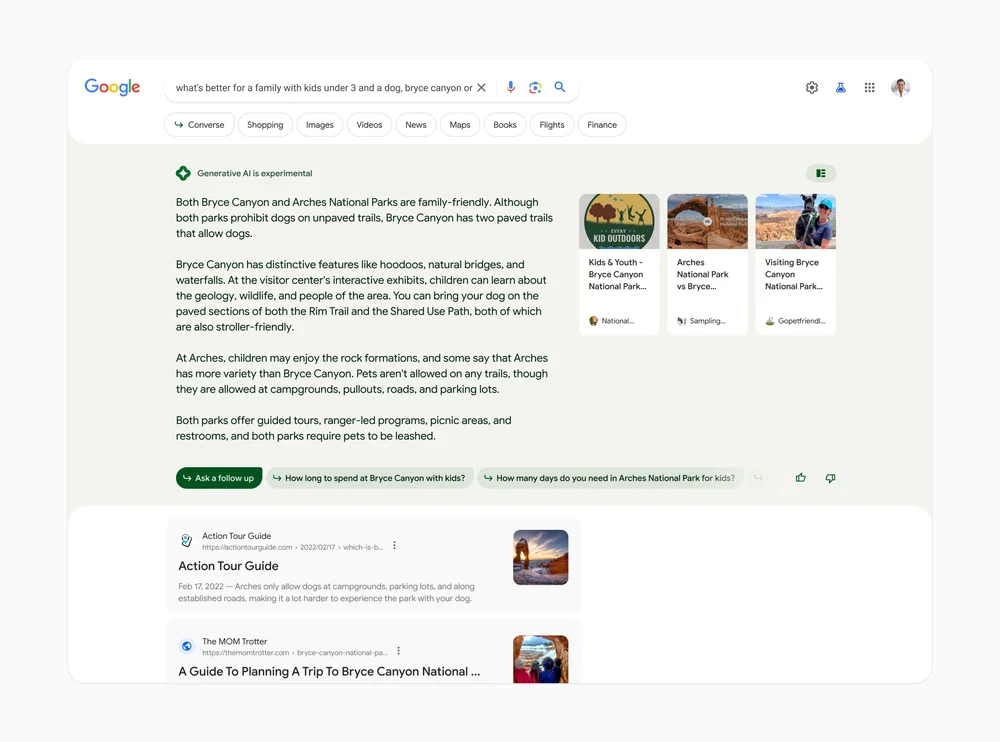
While potentially being extremely useful to the users, this AI trend may have a dramatic impact on the organic traffic. Google's result page will end up looking like this. Brands will compete for being cited in SGE and for a few organic placements still left on the page.
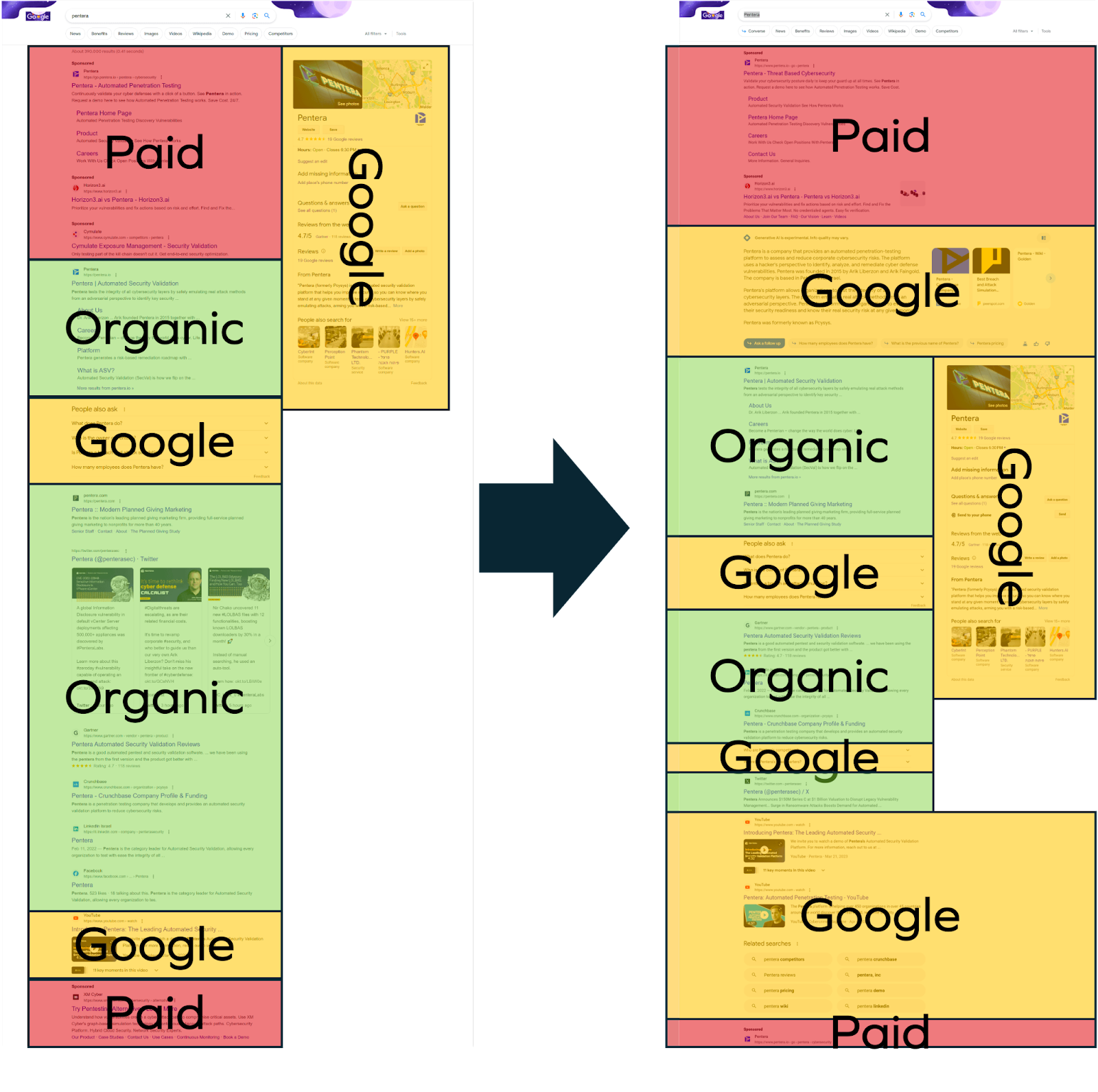
Actionable takeaways for marketers
- Both ChatGPT-like platforms and Google's SGE feed on our content — on what's available on the topic on the internet. This means content production and SEO optimization are no less vital in 2026 than before. You can think of SGE as another SERP feature you're competing for, and high-quality authoritative content is what will get your brand to appear in SGE and GenAI searches.
- Don't forget that there always will be AI skeptics or simply people who prefer to consume information directly from a reputable source, especially when it comes to sensitive or personally important topics.
2. AI-Assisted Decision Making Taking the Central Place
The key to the growing popularity of this AI trend is in AI's ability to process and interpret data at a scale and speed far beyond human capabilities. This phenomenon has already been studied by scientists. A group of social scientists from Harvard Business School analyzed how ChatGPT-4 affects the daily work of a global management consulting firm.
Another important aspect is AI's ability to mitigate human biases and judgment errors.
For instance, you run into a certain marketing challenge. By analyzing the data and deciding on a possible solution, you may tend to choose the one that you've already had experience with rather than the one that will generate the best results.
Unlike humans, AI algorithms operate without the influence of cognitive biases, ensuring decisions are made based on data and facts rather than personal preferences or assumptions.
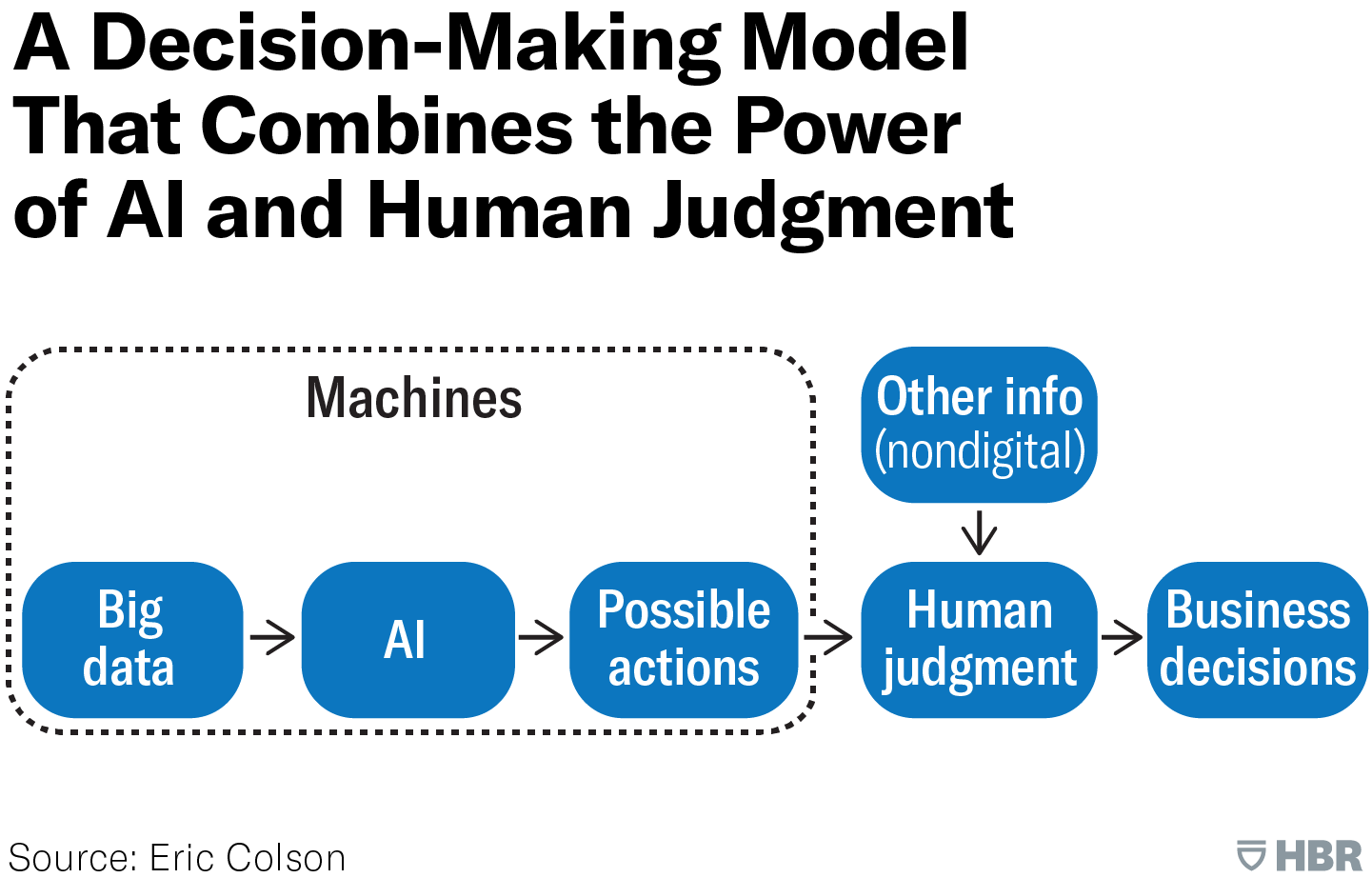
But this trend is not about replacing human judgment but augmenting it with intelligent, data-informed insights, leading to smarter, more effective business strategies.
There are instances when business decisions are affected by cultural events, non-digital communication, and other information inaccessible to AI.
For instance, the campaign goes live in multiple countries on a specific date and performs well except for one region. AI fails to identify the issue since the campaign was scheduled for an ideal time based on digital traffic patterns and historical data. AI is unable to take into account the cultural context to recognize the inappropriateness of the timing in this specific region – perhaps a day of national mourning or a sensitive historical anniversary.
Actionable takeaways for marketers
Embrace the change and test out the new decision-making model. Here's one way to do it.
Improvado introduces AI Agent, a solution run by AI algorithms and human input. It's a chat-like platform where you can ask any performance-related questions in plain English and receive immediate insights. The agent translates your questions into SQL and queries your dataset to provide you with an answer or report. Basically your marketing data starts speaking your language.
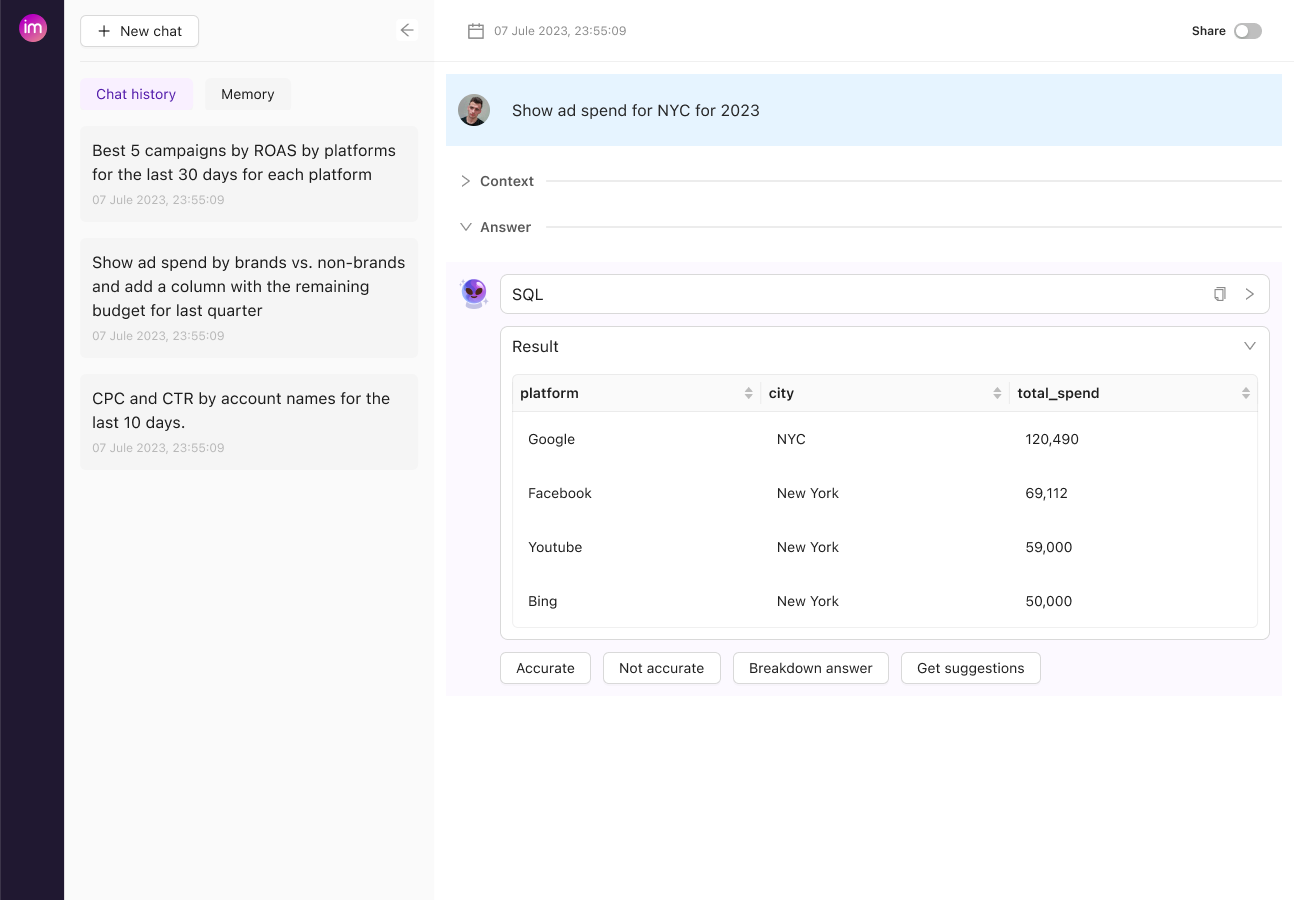
Here are some questions users have asked the agent this week:
- Show 30 best campaigns by ROI for the last 60 days for Google and Facebook.
- Show the top 50 landing pages by visits for the last year.
- Show me revenue in a weekly breakdown for the year 2023.
- Show me ad spend for the last 30 days for Facebook and Google.
- Compare conversion rates on Google Ads between October and September 2023.
Once you have your answer, you can continue your conversation with the agent and ask it to interpret results, provide more granular data or campaign advice.
3. AI Absence as a Cornerstone of Brand's Identity
As artificial intelligence becomes deeply integrated into the fabric of business and marketing, a countermovement is gaining momentum.
This AI-free trend emerges as a response to growing consumer concerns over privacy, authenticity, and the ethical implications of AI:
- Positioning as an AI-free brand can be a strategic marketing decision, tapping into current trends of digital detox and tech skepticism.
- Emphasizing human input and creativity can appeal to consumers who value authentic experiences and personal touch in products and services.
- Some customers associate human craftsmanship or intervention with higher quality, believing that it leads to more thoughtful, well-crafted products.
- AI can be seen as something complex — a lot of people use ChatGT, but only a few can explain how it works. Avoiding AI can be part of a strategy to appear more straightforward and transparent to customers.
A distinct market segment is increasingly drawn to authentic brands – businesses that openly avoid AI in favor of more traditional, human-centric approaches.
The movement is not limited to customer-brand relations. Major organizations like The New York Times and Reddit have taken a stand by updating their terms of service to prohibit the use of their and user-generated content for training AI systems. This decision underscores a growing awareness and sensitivity to how AI is reshaping content creation and consumption.
Some brands do this to prevent companies like Google and OpenAI from using their content to train systems without compensation. For others, this approach fosters trust and respect among customers, who can be assured that their content is not being used in ways other than what they have agreed to.
Actionable takeaways for marketers
- For brands considering their position in a market increasingly dominated by AI or safety-focused markets, this trend offers a unique opportunity. Abstinence from AI can be one of your value propositions.
- By limiting AI access to user-generated content, you can build trust between the brand and its users. Knowing that a company respects their data and content autonomy fosters a stronger, more positive relationship.
4. Topical Generative AI Assisting on a Customer Journey
One example of a topical generative AI is custom GPTs introduced by OpenAI. It's a tailored version of ChatGPT built for a specific use case or purpose.
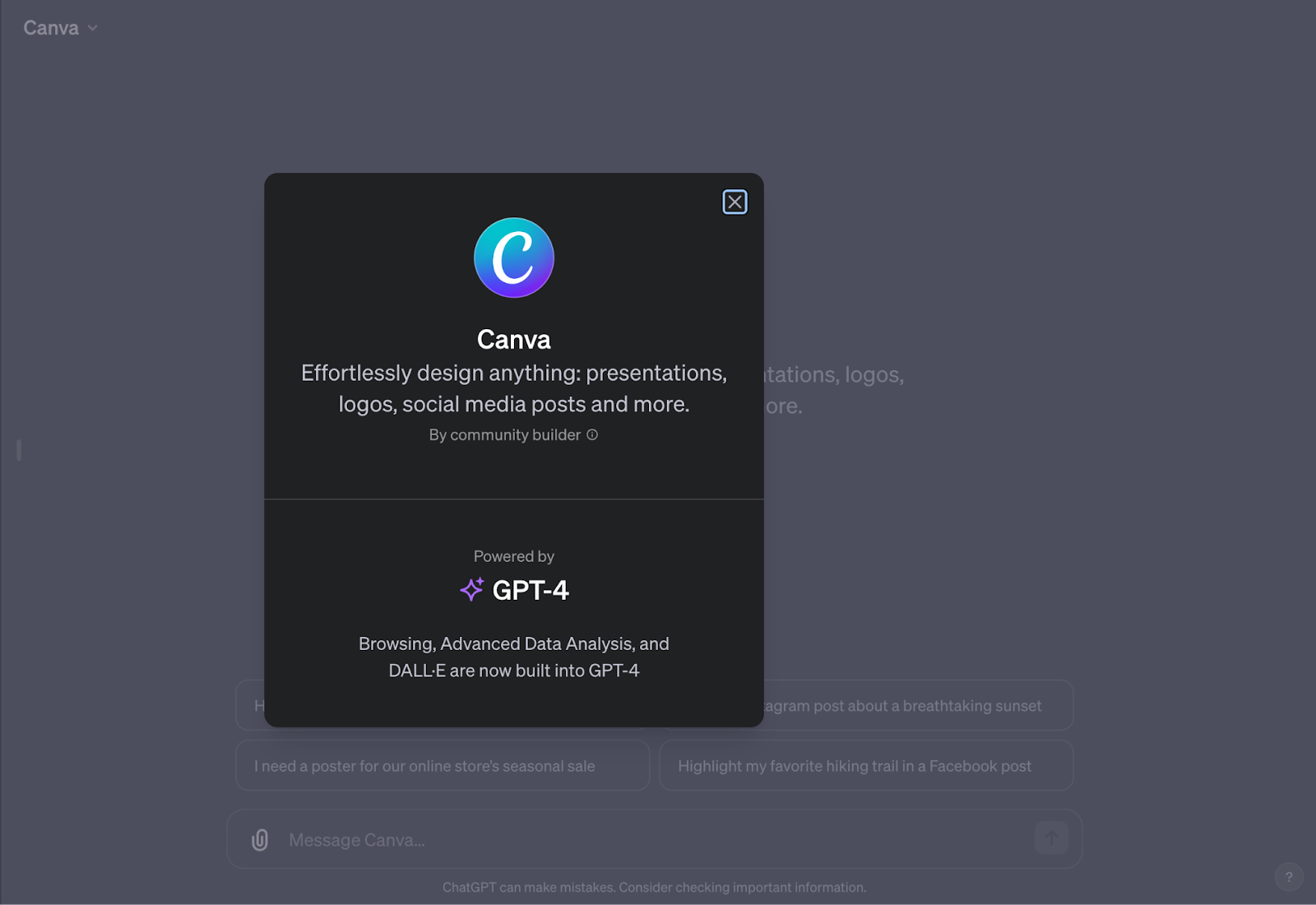
How can brands leverage custom GPTs or tools powered through GPT API? And why?
- Brands can build a custom GPT with limited product features and make it available to the public. The GPT will provide an interactive demo experience and give users a feel for how the product works in a real-world scenario. It's like a free version of the product: users test it out and when they grow out of a free version or are reassured of their choice, they switch to the paid version.
- The GPT can generate personalized narratives or use-case scenarios based on a prospect's industry or specific needs. By illustrating how the product solves real problems, it helps prospects visualize its value in their context.
- You can create virtual assistance that will help website visitors with product exploration. Custom GPTs can be fed product and company information and serve as an interactive knowledge base, offering a more dynamic and engaging experience than static web pages.
- Companies can create a gamified experience where prospects take part in challenges or quizzes about the product, led by the GPT, making the onboarding more engaging and memorable.
Actionable takeaways for marketers
- Look for stages in the customer journey that involve high levels of interaction or communication with customers. These could be points where customers seek information, require assistance, or provide feedback. Maybe you have a wide product range and the decision-making fatigue stops prospects from going down the sales funnel. An AI-powered assistant will help website users decide and proceed.
- Review the sales process, especially the stages involving customer inquiries, product explanations, or follow-ups. A custom GPT can assist in providing instant, detailed information to potential buyers.
- Use analytics tools to understand user behavior on your website or app. Sections with high dropout rates or where users spend the most time might benefit from an AI assistant.
5. Marketing to Machine Customers
This AI trend is a bit more forward-looking than others. But still, it presents growth opportunities and will gain more momentum with time.
Who are these machine customers?
A programmatic advertising platform is also considered a machine customer since it is an automated system that buys ad space in real-time based on specific targeting criteria and performance metrics.
The rise of non-human customers is changing the sales and marketing processes. Machine customers rely heavily on data for their decision-making processes. They analyze historical data, current trends, user preferences, and other relevant information to make informed purchasing decisions.
Thus, marketing efforts need to be heavily data-oriented. This includes providing detailed product specifications, performance data, and integration capabilities that machines can analyze and act upon.
Emotional branding and human-centric persuasive techniques are less relevant for non-human customers. Instead, the emphasis is on the performance, reliability, and technical superiority of the products or services.
Actionable takeaways for marketers
- The rise of non-human customers will first impact the B2B sphere and industries where customers are less personally attached to the product. Before implementing any changes to the website and marketing efforts, analyze if your industry is on the frontline of this AI trend.
- If this trend is applicable to your industry, analyze your website and consider how you can add more performance and technical information. Maybe you can revise the documentation section and make it data-heavy.
6. AI, AR, VR, and the Integration of Extended Reality into the Buying Process
While not new, the VR and AR trend is gaining a new stance with the integration of AI. Artificial intelligence creates more immersive, personalized, and interactive experiences for consumers, especially in the ecommerce industry.
Generative AI can assist customers in visualizing products in real-time. For example, it can generate images of furniture in a customer’s actual living space, or show how different colors and styles of a product might look, aiding in decision-making.
One example of this AI trend is a new shopping feature introduced by Google in June 2023. Google's virtual try-on for clothes uses generative AI to show you pieces on a wide selection of real models, ranging in sizes XXS-4XL representing different skin tones, body shapes, ethnicities, and hair types.
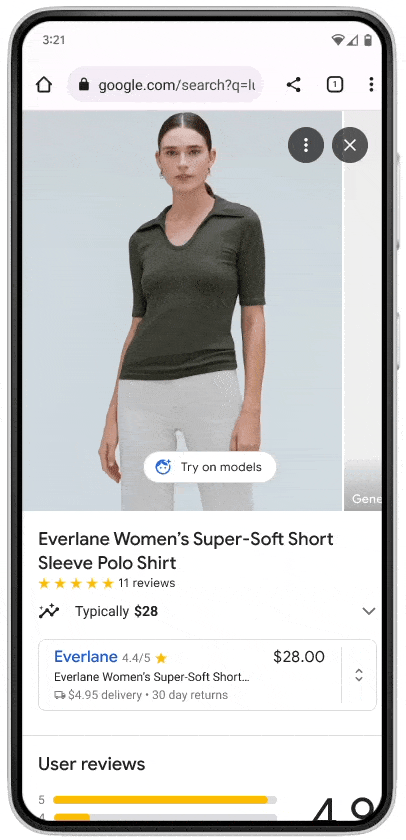
Another strategy is to leverage AI to create virtual assistants that can guide customers, answer their questions, provide information, and offer personalized recommendations. These assistants can enhance customer engagement and provide a seamless shopping experience.
An example of how AI can be integrated into the buying process is the Uniqlo virtual shopping assistant IQ which helps with order statuses, finding products, finding the right size, and more.
Actionable takeaways for marketers
- Virtual assistants can intelligently suggest additional products (cross-selling) or upgrades (upselling), increasing the average order value. Work on the proper messaging to not seem pushy and help customers feel as if they interact with an actual assistant.
- Through interactions, the AI assistant can gather data on customer preferences, pain points, and behaviors, analyze these data to derive valuable insights for tailoring marketing strategies and product offerings.
- The virtual assistant can qualify leads by asking specific questions and directing potential customers to appropriate products or services, think of qualification metrics and how you can streamline the process.
7. More Formalized AI Ethics
The marketing sphere is increasingly moving towards more formalized AI ethics, driven by a growing recognition of the potential risks and ethical considerations associated with the use of AI in marketing.
Many organizations are establishing formal ethical guidelines for AI use. These guidelines often cover issues such as data privacy, transparency in AI-driven decisions, and avoiding biases in generative AI algorithms.
Here's an example. Your brand previously focused all its marketing activities on specific demographics, let's say, college graduates. Much later, you start expanding and marketing products to new customer segments.
However, if your AI system has been trained primarily on data involving your original customer group, it might inadvertently exhibit biases when you start targeting new segments. For instance, AI could continue to favor marketing strategies, language, and content that resonates with college graduates, which may not be as effective or appealing to your new target audiences.
This bias occurs because the AI has learned patterns and preferences based on historical data. To address this issue, it's crucial to retrain the AI system with a more diverse and representative dataset that includes information about the new customer segments.
Another important issue is to monitor the output of generative AI. There have been several instances when AI-generated artwork received backlash.
We keep telling y’all that bias is built into this A/I generated garbage. https://t.co/SY62kliLvw
— D.J. - Mauga Fan Club CEO (@OhHeyDJ) July 9, 2023
Actionable takeaways for marketers
- Set company rules for AI use. Can your marketing team use generative AI to produce visuals for ad campaigns or not? Should the team validate every decision made by the AI system?
- Privacy and data protection should be the key priority at any time.
- Diversify input data and make it an on-going practice to make sure your AI system doesn't discriminate against underrepresented customer groups.
Bonus: The Impact of AI on Marketing Jobs
The final trend addresses the impact of AI on the marketing profession itself.
A lot of marketing specialists are concerned about AI replacing their jobs in the upcoming years. While it can be a possibility in the distant future, it's very unlikely to happen in the next few years.
A more realistic approach is to think of AI more as a collaborative partner.
Although, the integration of AI into marketing operations is leading to a shift in the skill sets required for marketing professionals.
What can be done:
- Reskill your workforce: Offer training for your marketing team to adapt to AI-centric roles. Focus on developing skills that complement AI capabilities, such as strategic thinking and creative problem-solving.
- Emphasize creative and strategic skills: Focus on developing the creative and strategic skills of your team that AI can’t replicate. Encourage your team to use AI as a tool to enhance their own abilities and creativity.
- Foster human-AI collaboration: Encourage a culture where AI tools are seen as partners rather than replacements. Promote an understanding of how AI can enhance human work, not just automate it.
Looking Forward
As we close the chapter, it's clear that the fusion of AI with marketing is more than a trend—it's a paradigm shift.
The seven key AI marketing trends for 2024 present a future where marketing transcends traditional boundaries, becoming more personalized, immersive, and ethical. By embracing generative AI, diving deep into data for customer insights, committing to ethical practices, exploring augmented realities, enhancing conversational AI, and adapting to new roles in the marketing job landscape, marketers can navigate this new terrain with confidence. The future of marketing is not just about adopting new technologies, it's about reimagining the connection between brands and their audiences in an AI-driven world.
.png)



.png)
